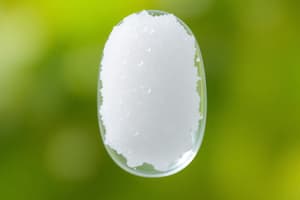Podcast
Questions and Answers
Which process plays a key role in the homeostatic balancing act by ensuring constant water content of cells?
Which process plays a key role in the homeostatic balancing act by ensuring constant water content of cells?
- Active transport
- Osmosis (correct)
- Filtration
- Diffusion
What is the main purpose of excretion in the context of osmoregulation?
What is the main purpose of excretion in the context of osmoregulation?
- Maintaining blood pressure
- Balancing pH levels
- Regulating body temperature
- Removing waste products (correct)
Why is osmoregulation particularly important for organisms living in environments with fluctuating temperatures?
Why is osmoregulation particularly important for organisms living in environments with fluctuating temperatures?
- To maintain constant water content in cells (correct)
- To regulate blood glucose levels
- To adjust sweat rate
- To control electrolyte balance
What compounds need to be balanced by osmoregulation to maintain homeostasis?
What compounds need to be balanced by osmoregulation to maintain homeostasis?
In what way do terrestrial animals cope with challenges related to osmoregulation?
In what way do terrestrial animals cope with challenges related to osmoregulation?
Which phenomenon involves moving water through cell walls due to differences in solute concentration?
Which phenomenon involves moving water through cell walls due to differences in solute concentration?
Flashcards are hidden until you start studying
Study Notes
Homeostasis is a critical process within our bodies, keeping us alive by maintaining proper conditions for essential systems such as temperature control, blood pressure, pH levels, and electrolyte balance. Osmoregulation plays a key role in this homeostatic balancing act by ensuring that the water content of cells remains constant even when our environment may cause changes. This is especially important for organisms living in environments with fluctuating temperatures, humidity, or salt concentrations.
When it comes to osmoregulation specifically, two main processes occur: osmosis and excretion. Osmosis involves moving water through cell walls in response to differences in solute concentration, changing the water content inside versus outside the cell. Excretion refers to removing waste products from your body, which can change the overall composition of your internal fluids. These processes help maintain the right balance between various compounds like glucose, amino acids, sodium, potassium, calcium, chloride, bicarbonate, and phosphate.
For example, animals need to regulate their hydration status constantly due to environmental factors like heat stress or high evaporation rates caused by wind or low relative humidity. Terrestrial animals have developed strategies to cope with these challenges, including adjusting sweat rate and cutaneous secretions. In reptiles, these strategies involve increasing water loss by losing more salts per kilogram of water lost compared to mammals; birds also lose less water because they have feathers instead of fur.
In conclusion, understanding how homeostasis works and its importance in regulating bodily functions helps us appreciate the delicate balance required for life itself. Osmoregulation forms part of this vital system, helping us adapt to varying conditions both internally and externally, enabling us to stay healthy and alive.
Studying That Suits You
Use AI to generate personalized quizzes and flashcards to suit your learning preferences.




